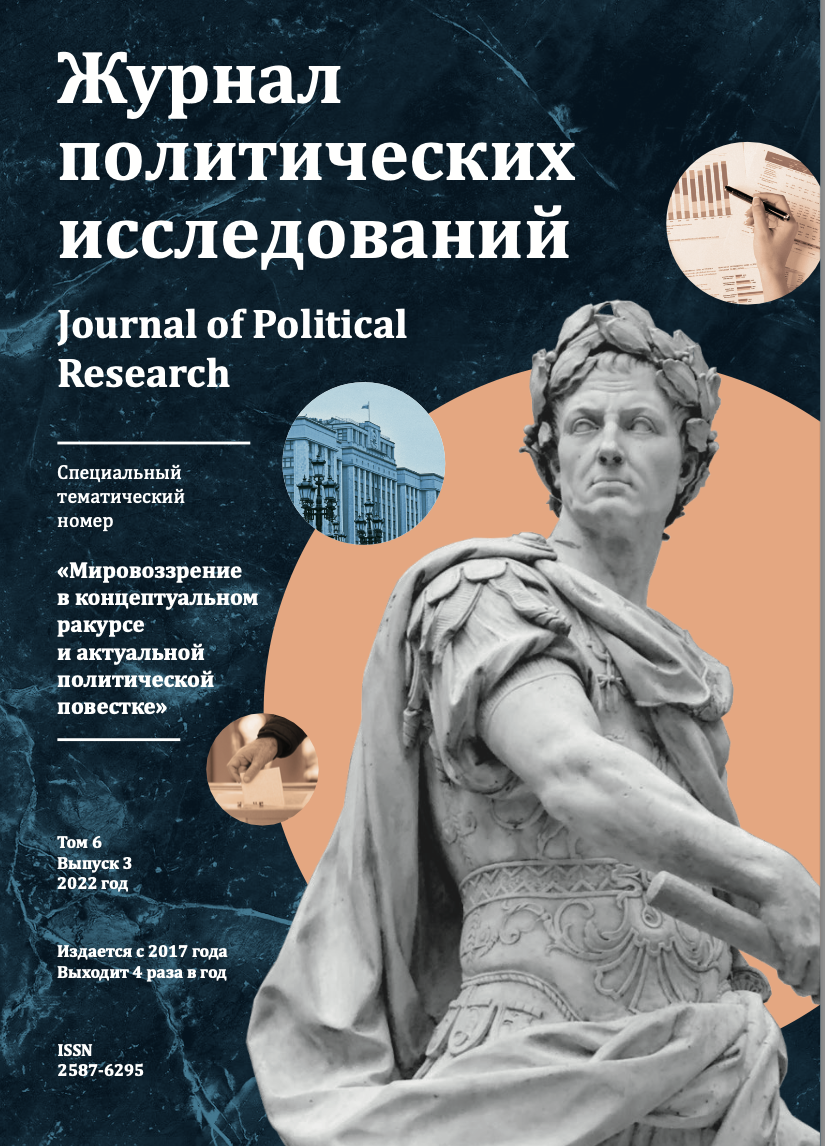Russian Federation
UDK 329.1/.6 Политические партии и движения в соответствии с их общеполитическими взглядами и целями
UDK 32.019.52 Изучение общественного мнения
The purpose of this article is to identify the potential of the cultural war concept for the analysis of political and worldview conflicts in American and other modern societies. Based on the methods of case study, literature and statistics analysis, the article provides the main provisions of the concept and analyzes key academic discussions about the features of the application of this theoretical perspective to American social and political life. The author identifies two approaches to the analysis of cultural wars – empirical and systemic (bipolar). The classification of the “hot buttons” of cultural wars in modern, primarily Western, societies is given. The thesis is put forward that although it is impossible to reduce all moral confrontations to the conflict of “orthodox” and “progressivists”, the bipolar approach often turns out to be useful for understanding the most significant culture wars. The author comes to the conclusion that the thesis about culture wars being waged in the United States not only withstands the criticism put forward by skeptics, but also becomes more and more relevant against the backdrop of the contradictory trends of the modern world. This conclusion is consistent with theoretical and empirical studies of political psychology and sociology, pointing to the deep nature of citizens' opinions on moral and identity issues. The concept of culture war as a theoretical perspective that points to the fundamental nature of differences of opinion on moral and ethical issues can also shed light on processes taking place in other countries, including Russia.
culture war, political culture, political polarization, ideology, worldviews, US politics
1. Kazarinova D.B. Evolyutsiya ponyatiya «kul'turnaya voyna» v zapadnoy politicheskoy mysli [The evolution of the concept of "culture war" in Western political thought]. Mozaichnoe pole mirovoy i rossiyskoy publichnoy politiki. Politicheskaya nauka: Ezhegodnik 2020-2021 [Mosaic field of world and Russian public policy. Political Science: Yearbook 2020-2021]. Moscow; Tomsk, Izdatel'stvo Tomskogo gosudarstvennogo universiteta Publ., 2021, 438 p. (In Russian).
2. Lipset S.M., Rokkan C. Struktury razmezhevaniy, partiynye sistemy i predpochteniya izbirateley [Cleavage structures, party systems, and voter alignments]. Partii i vybory: Khrestomatiya [Parties and Elections: Reader]. V. 1, M., INION Publ., 2004, 150 p. (In Russian).
3. Polulyakh D.S. Rossiyanin v kontekste kul'turnykh voyn budushchego [The Russian citizen in the context of the culture wars of the future]. Rossiya 2030 glazami molodykh uchenykh / Materialy IV Vserossiyskoy nauchnoy konferentsii (Moskva, sentyabr'-noyabr' 2012 g). Sbornik [Russia 2030 through the eyes of young scientists / Proceedings of the IV All-Russian Scientific Conference (Moscow, September-November 2012). Collection]. M., Nauchnyy ekspert Publ., 2013, 458 p. (In Russian).
4. Ansolabehere S., Rodden J., Snyder J.M. Purple America, Journal of Economic Perspectives, 2006, V. 20, I. 2, pp. 97-118.
5. Fiorina M.P., Abrams S.J., Pope J. Culture War? : The Myth of a Polarized America, New York, Pearson Longman Publ., 2005, 116 p.
6. Goren P., Chapp C. Moral Power: How Public Opinion on Culture War Issues Shapes Partisan Predispositions and Religious Orientations, American Political Science Review, 2017, V. 111, I. 1, pp. 110-128.
7. Hetherington M., Weiler J. Prius or Pickup? How the Answers to Four Simple Questions Explain America’s Great Divide, Boston, Houghton Mifflin Harcourt Publ., 2018, 289 p.
8. Hunter J.D. Culture Wars: The Struggle to Define America, New York, Basic Books Publ., 1991, 416 p.
9. Hunter J.D., Wolfe A., Dionne E.J., Cromartie M. Is There a Culture War?: A Dialogue on Values and American Public Life. Washington, D.C.: Brookings Institution Press Publ., 2006. 118 p.
10. Klein E. Why We're Polarized, New York, Avid Reader Press Publ., 2020, 336 p.
11. Mason L. ‘I Disrespectfully Agree’: The Differential Effects of Partisan Sorting on Social and Issue Polarization, American Journal of Political Science, 2015, V. 59, I. 1, pp. 128-145
12. McCarty N. Polarization: What Everyone Needs to Know, New York, Oxford University Press Publ., 2019, 258 p.
13. Melzer S. Gun Crusaders: The NRA’s Culture War, New York: New York University Press Publ., 2009, 323 p.
14. Wolfe A. One Nation, After All: What Middle Class Americans Really Think about God, Country, Family, Racism, Welfare, Immigration, Homosexuality, Work, the Right, the Left, and Each Other, New York, Viking Penguin Publ., 1998, 359 p.




















